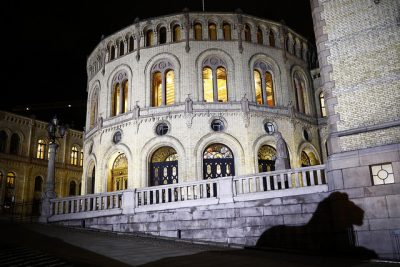Norway’s Parliament (Stortinget) is being stirred up once again by a new debate over the country’s abortion law that critics call “unprofessional” and little more than part of a “bidding round” for support from the Christian Democrats. A majority from that small party, meanwhile, was looking more likely on Tuesday to keep Norway’s current conservative coalition government in power.

The abortion issue, sensitive also in Norway’s liberal social democracy, flared up again just last week as leaders of the centrist Christian Democrats (Kristelig Folkeparti, KrF) quarrel over whether to support the left or right sides of Norwegian politics. If there’s one issue that unites KrF, it’s opposition to abortion and especially to what KrF members call creation of a sorteringssamfunn, a society in which pregnant women can choose to carry only one fetus in cases of twins, triplets or more (alled tvillingabort), for example, or abort a fetus that may have physical or functional hindrances such as Downs Syndrome.
Health Minister Bent Høie of the Conservatives told newspaper Aftenposten on Tuesday that KrF Deputy Leader Kjell Ingolf Ropstad, who wants his party to remain loyal to or even join Prime Minister Erna Solberg’s conservative coalition, reportedly asked Solberg whether she’d be willing to negotiate some aspects of Norway’s current law. KrF wants to disallow tvillingabort and abortion of a fetus with serious illness or other difficulties after 12 weeks of pregnancy.
“She (Solberg) responded to a concrete challenge from the deputy leader of KrF, who wanted to know whether the Conservatives and Labour parties could negotiate these issues,” Høie wrote in an email to Aftenposten. Labour Party leader Jonas Gahr Støre said “no.” Solberg said “yes,” and that immediately appealed to Christian Democrats while igniting not just many politicians from Labour and other socialist parties but also thousands of others who flare over any proposed changes in abortion rights.
Solberg under fire
As women’s organizations like Kvinnefronten, political parties like the Socialist Left (SV), the Reds and Labour’s chapter in Oslo, and the radical group Blitz mobilized for a major protest demonstration in front of Parliament Monday evening, Solberg also came under fire from opposition politicians including the leader of the Center Party, Trygve Slagsvold Vedum. He’s keen to get the left-leaning Christian Democrats to join Center and Labour in the formation of a new left-center government. Even though Vedum’s rural-friendly party that backs Norway’s “Christian cultural heritage” is often viewed as most closely alligned with KrF, he knows that any government with Labour will never be keen to alter existing abortion rights. He thus had nothing to offer Ropstad and KrF like Solberg did.
Vedum thus resorted to attacking Solberg for trying to win support from the Christian Democrats in a “grotesque” manner. Vedum claimed his own party would never stoop to carrying out a “bidding round” over what he called “deep, ethical issues” in order to retain government power.
Høie scoffed how Vedum vented his alleged indignation to a variety of Norwegian media on Monday, calling it “a completely unreasonable attack on the prime minister.” He stressed that the Conservatives also are firm about retaining women’s rights to abortion in Norway, and only open to some changes following thorough debate. The leader of the Conservatives’ delegation in Parliament, Trond Helleland, claimed it stood firmly behind Solberg’s response to the Christian Democrats.
Abortion issue can be decisive
Now some commentators believe the abortion issue can end up deciding whether the Christian Democrats switch sides politically or stick with the conservative government. Trine Eilertsen, political editor of Aftenposten, wrote on Tuesday that she think changes in the abortion law will be made if the Christian Democrats reject their leader Knut Arild Hareide’s call to join forces with Labour and Center in a new government, and vote to join Solberg’s coalition instead. It would then have a majority in Parliament, meaning that any initiative agreed among its four parties (the Conservatives, Progress, the Liberals and Christian Democrats) would win approval.
“As KrF enters what for once deserves to be called its ‘destiny week,’ abortion is likely to be a decisive factor,” Eilertsen wrote. She called it “more or less an ultimatum” from the Christian Democrats that may force concessions from Solberg’s government to keep it in power. Others feel Solberg may just be so grateful for retaining KrF’s support that she’ll go along with tightening rules on late-term abortion.
Others stress that abortion rights and women’s free choice in general won’t be compromised, only “tightened” to appease KrF by acknowledging its definition of “human value,” one of the main reasons for its existence. Monday’s demonstration against any changes in abotion law may have proven to many Christian Democrats that Labour and other left-wing parties don’t understand them.
After two more local KrF chapters voted on their political direction on Monday, analysts were contending that there’s now likely to be a majority of conservative delegates at the party’s national meeting on Friday. The voting in Akershus and Oslo resulted in 95 delegates keen on joining Solberg’s government and 87 wanting to form a new government with Labour. The final vote Tuesday evening in Østfold County was expected to also yield conservative support that could keep Solberg in power.
newsinenglish.no/Nina Berglund

